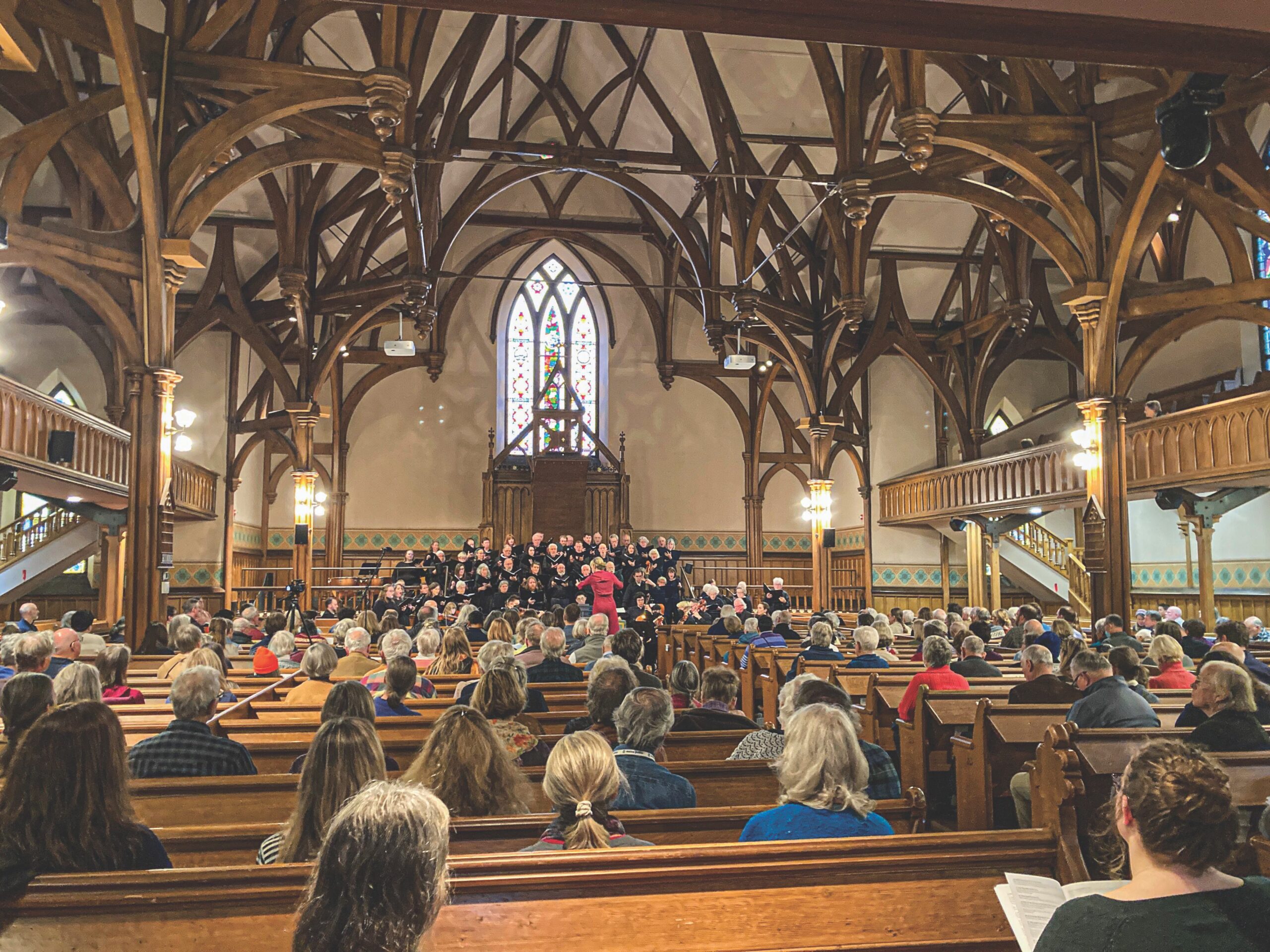Messing with “Messiah”: Handel’s oratorio re-imagined for a more inclusive world
November 10, 2023
 Courtesy of Classical Uprising
Courtesy of Classical UprisingLast Saturday afternoon, melodies filled Brunswick’s First Parish Church as Classical Uprising’s symphony of voices and instruments captivated audience members, even leading some to tears.
This was “Messiah. Multiplied.”: German-born Baroque composer George Frideric Handel’s seminal work, performed in November in an effort to intentionally disassociate the work from Christmas and re-envisioned by Brooklyn-based ChamberQUEER in collaboration with Maine’s Oratorio Chorale and Classical Uprising.
Saturday’s performance was the brainchild of Emily Isaacson, founder and artistic director of Classical Uprising, a non-profit organization focused on classical music and performance events, in coordination with co-founders and ChamberQUEER members Jules Biber, Danielle Buonaiuto, Brian Mummert and Elijah McCormack.
“Messiah” is the earliest known piece of music in the Western canon that has been continuously performed each year, according to Isaacson. A performance of the oratorio—an expansive musical work that features vocal and instrumental parts—typically lasts from one-and-a-half to two hours. Handel’s “Messiah” follows a three-part structure and follows the prophecy, life and glorification of Jesus Christ.
“Messiah. Multiplied.” included 28 movements, a full choir and chamber orchestra as well as five vocal soloists. Unlike traditional renditions of “Messiah,” “Messiah. Multiplied.” embraces a more ambiguous understanding of religion, gender and sexuality.
“[‘Messiah. Multiplied.’], like so much of Classical Uprising’s work, is inspired by a belief that classical music must rise up, challenge current norms and re-envision where, how and for whom we are making music,” Isaacson wrote in her program notes.
The project is directly derived from Handel’s original oratorio, but changes the order of the movements and modifies pronouns used for Messiah and God from “he” to “we.”
To the audience and the musicians alike, the modifications aimed to be freeing rather than disarming. The seemingly simple changes acknowledge a version of Handel that resists heteronormative rhetoric and invites a more inclusive interpretation of the work, according to Isaacson.
“‘Messiah. Multiplied.’ makes room for what may be Handel’s more authentic voice by proposing that Handel’s alterations were made not just for logistical reasons but to represent and embrace the fluid vision of gender and sexuality that was present among his 18th-century aristocratic communities,” Isaacson wrote. “[The project] un-genders and de-theologizes the text to tell a universal story of trying to repair the world.”
The performance featured non-binary and trans members of ChamberQUEER, an organization which highlights LGBTQ+ voices in classical music.
“ChamberQUEER is an organization that does a lot of messing with the canon,” soloist Danielle Buonaiuto said. “[There is] so often something else to be heard. Even if you just leave the music as it is, change something else about what’s going on with it, how you position it, who’s performing it, in what space it is being performed, what instruments, what other music is decided in the program, all of those things can start to make you ask questions.”
The program included a pre-performance lecture from Isaacson and a post-performance conversation with Isaacson, performers and ChamberQUEER founders. Among those who spoke, soloists like Mummert and Buonaiuto alluded to their experience growing up in churches and of their perspective returning years later to perform a work seminal to Christianity.
“[Buonaiuto and I] both grew up and have spent a lot of our careers singing church music in churches, often in Catholic churches,” Mummert said. “It’s weird to feel like you’re contributing to the aggrandizement of an organization and an institution that’s actively fighting against your interests.”
Buonaiuto shared that altering “Messiah” enabled her to find a more profound understanding of herself. Still, like Mummert, she experienced some qualms about returning to a church as a queer person because of her experience with feelings of shame and guilt in the religious context in which she grew up.
Male soprano and soloist Elijah McCormack acknowledged the challenge of performing in a space that can feel historically unwelcoming, even hostile, to trans people.
“As a transgender person, interacting with religious spaces can be very strange,” McCormack said. “You never really know what the attitude is going to be.”
McCormack added that inclusive expressions of gender or queer love should not require “reconciliation” as a prerequisite to engage in any sphere, particularly that of the church.
“I feel quite strongly that [LGBTQ+ identity] is not something that needs to be reconciled,” he said. “I feel that so much of [‘Messiah’] is about transformation. I don’t think that there needs to be anything that is regarded as un-Christlike about a transgender spirit.”
“Messiah. Multiplied.” welcomed a large and enthusiastic audience, including members of First Parish Church, residents of Brunswick and surrounding towns, three young students traveling from Boston and several current Bowdoin students who formerly sang with the Oratorio Chorale.
“This program made me feel inspired and nostalgic,” Yaerin Wallenberger ’25 wrote in an email to the Orient. “It was a perfect program for anyone who appreciates the traditions of classical music and also values working toward social progress and radical inclusion.”
“Why mess with ‘Messiah?’” the concert’s program asks. Its answer? “So that more people can share in its power.”

Comments
Before submitting a comment, please review our comment policy. Some key points from the policy: